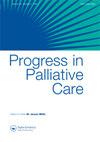‘It’s like a wedding planner’: Dying2Learn Massive Open Online Course participants views of the Death Doula role
IF 0.8
Q4 PUBLIC, ENVIRONMENTAL & OCCUPATIONAL HEALTH
引用次数: 1
Abstract
A Dying2learn Massive Open Online Course (MOOC) was held in 2020 with the aim of bringing the community together to talk about death and dying, with participants undertaking activities, contributing comments, and sharing thoughts and feelings. An activity was posed for participants within a compassionate communities’ framework related to the Death Doula role. As we were interested in the views regarding the Death Doula role by those without a professional background in healthcare. We extracted comments from this cohort of course participants (n = 147) and analysed them in NVivo. Eight themes were subsequently generated: (1) It is new to me, and I have no experience with one, (2) I have heard of it, and I have met one, (3) There is a place for it, but what about the role of family and friends, (4) Death doula training, finding the role interesting and wanting to know more, (5) Creating community, supporting the dying and helping loved ones, (6) I am one, I do this informally, or I want to be one, (7) The name, the industry, paying someone (8) Providing an alternative and recognising similar roles. The Dying2Learn community MOOC participants felt that there was value in having a supportive role such as a Death Doula and that it had importance for individuals and society. It was also apparent that the Death Doula role generated considerable interest from participants.“这就像一个婚礼策划师”:Dying2Learn大规模开放在线课程参与者对死亡导乐角色的看法
2020年举办了一个死亡2学习大规模开放在线课程(MOOC),旨在将社区聚集在一起,讨论死亡和死亡,参与者开展活动,发表评论,分享想法和感受。在与Death Doula角色相关的富有同情心的社区框架内,为参与者提出了一项活动。由于我们对那些没有医疗专业背景的人对Death Doula角色的看法很感兴趣。我们从这组课程参与者(n = 147),并在NVivo中对其进行分析。随后产生了八个主题:(1)这对我来说是新的,我没有体验过,(2)我听说过,也遇到过,(3)它有一席之地,但家人和朋友的角色怎么样,我做这件事是非正式的,或者我想成为其中之一,(7)名字、行业、付钱给某人(8)提供替代方案并认可类似的角色。Dying2Learn社区MOOC参与者认为,扮演死亡斗拉这样的支持角色是有价值的,它对个人和社会都很重要。同样显而易见的是,死亡杜拉的角色引起了参与者的极大兴趣。
本文章由计算机程序翻译,如有差异,请以英文原文为准。
求助全文
约1分钟内获得全文
求助全文
来源期刊

PROGRESS IN PALLIATIVE CARE
PUBLIC, ENVIRONMENTAL & OCCUPATIONAL HEALTH-
CiteScore
2.60
自引率
11.80%
发文量
24
期刊介绍:
Progress in Palliative Care is a peer reviewed, multidisciplinary journal with an international perspective. It provides a central point of reference for all members of the palliative care community: medical consultants, nurses, hospital support teams, home care teams, hospice directors and administrators, pain centre staff, social workers, chaplains, counsellors, information staff, paramedical staff and self-help groups. The emphasis of the journal is on the rapid exchange of information amongst those working in palliative care. Progress in Palliative Care embraces all aspects of the management of the problems of end-stage disease.
 求助内容:
求助内容: 应助结果提醒方式:
应助结果提醒方式:


